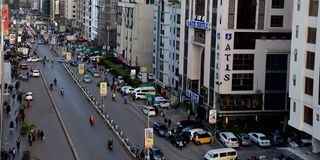
New buildings and some still under construction on General Waruingi Street, Eastleigh.
This year been eventful for many stakeholders in real estate. With the Kenya shilling depreciating against the American dollar, the cost of building materials such as cement and steel have significantly gone up.
The situation has been compounded by the high cost of living and reduction of disposable income, which have resulted in many properties remaining vacant.
Amidst the challenges, however, the industry has shown resilience, posting improved performance compared to the previous year.
As the country ushers in the new year, many real estate players will be looking at how to improve their investment prospects.
DN2 Property asked experts to shed light on the most promising investment destinations in 2024.
Eastleigh
In the last five to 10 years, the once rundown Eastleigh estate in Nairobi has undergone significant transformation.
Old buildings have been brought down to make way for new ones, large enough to accommodate more businesses and households.
Five to seven-storey buildings that were put up even just a decade ago are being torn down to pave way for 10-15-floor towers to cater to the growing housing demand in the estate.
Most are major mixed use developments that combine residential, commercial and social elements.
They include apartments, shops, hotels, restaurants, hospitals, schools and mosques.
The integrated community projects have made Eastleigh an attractive place to live and invest.
“The neighbourhood has witnessed an explosion of property developments and undergone a remarkable transformation that has made it a more desirable place to live, do business, work and visit,” says Yusuf Hassan Abdi, the longtime Kamukunji Member of Parliament.
The pace of development in Eastleigh has made it one of the most attractive neighbourhoods commercially in Nairobi, going by the many economic indicators.
A two-bedroom apartment in Eastleigh, for instance, now goes for about Sh5 million on average, while a three-bedroom is Sh6 million. This is the same price for property in nodes like South C and South B, which just years ago, were twice as expensive as Eastleigh.
This was unheard of a decade ago, when few people were interested in acquiring property for investment in Eastleigh, citing security and other factors.
“The phenomenal growth of Eastleigh as a centre of investment in property is unprecedented. If you walk on Kipanga Athumani Road or what residents know as Jam Street, you will witness a thriving shopping area with residential and commercial properties,” the MP says.
The area is now filled with modern complexes, including Yare towers.
Eastleigh Section 7 has become a city within a city, where major developments have changed and transformed the face of the neighbourhood.
The other area booming with real estate developments is the part between Muratina Road and First Avenue.
“But the crown jewel of Eastleigh is the Business Bay Square Mall. This is what is driving the economy of Eastleigh at the moment. It is the anchor and the centre of development. The mall has taken Eastleigh to a higher level of competitiveness when it comes to property development and investment,” the lawmaker adds.

Visitors at the Business Bay Square Mall in Eastleigh, Nairobi.
The multimillion-shilling project on General Waruinge Street, sits on a 6.4-acre piece.
It is now the largest mall in East and Central Africa.
The mall, owned by Ten Commodities Wholesalers Ltd, has a seven-star hotel, residential apartments, more than 3,500 shops, three hospitals, 12 banks, 32 restaurants, and 2,200 parking spaces.
Ismail Shine, a marketing manager with Tijara Realty Company, says due to the high demand of housing in Eastleigh, it can be stressful to find vacant property, whether for investment or residential purposes.
Most people book spaces even before construction of a building is complete.
“People start paying deposit when the building is still under construction. It is not uncommon to find people seeking to occupy a building that is under construction being put on the waiting list. That shows a very high demand that is difficult to meet,” shine says.
According to Shine, Eastleigh is an ideal investment destination because most of businesses are governed by Sharia law, which does not allow traders to charge interest on off-plan sale agreements, in order to make a profit.
The businesses are supposed to find other ways of making profit.
An investor, therefore, buys into a project knowing that the amount they have agreed on with the seller at the onset is what they will be required to pay when the stipulated period ends.
In the event that the buyer is unable to pay the full amount when this time lapses, the two parties will either renegotiate their initial agreement or the seller will find an alternative investor and refund the money to the one who had paid deposit.
“Much of the investment is not in the form of debt. It is actually equity-based. No interest is charged so there is no pressure on the investor,” Shine says.
“They are also allowed to pay, based on their monthly earnings. As easy as that, someone can own a flat in Eastleigh.”
He, however, adds that while Eastleigh has seen a lot of private developments, public amenities have been neglected, with green spaces disappearing as a result of the pressure brought about by an increase in population.
This is a problem as it is making the new developments less lucrative.
Shine says addressing matters like sanitation, green spaces, waste collection and infrastructure will go a long way in making Eastleigh a more attractive investment destination.
Athi River
While Eastleigh is becoming popular for residential and commercial activities, Kelvin Mutuma – a Sales Manager at Purple Dot International – says improved infrastructure and affordable land are making Athi River town an attractive destination for investment in the industrial and warehousing activities.
The proposal to extend the standard gauge railway to Athi River’s Export Processing Zone, for instance, has sparked speculation that has led to a 6.1 per cent increase in land prices in the area this year. It is projected to rise further.
“As a result of developments in infrastructure, we have seen an influx of Chinese investors who are focused on manufacture. They are taking up much space in Athi River and investing widely in warehousing,” Mutuma says.
He adds that as more Kenyans embrace online shopping as a convenient way to purchasing essential household goods, retailers as well as logistics companies are finding themselves in need of extra space to store and manage the items.
These spaces are not only enabling companies to effectively track and manage their inventory thus reducing errors likely to be made during the order fulfilment process, but also to distribute and deliver their products in a timely way.
As a result of the rapid growth in their demand, these facilities – once only viewed as large plain buildings located in industrial zones or remote areas – are now being seen as real estate assets.
“The demand for warehouses and industrial space is expected to remain robust across the country, with continued growth in rental rates, decreases in vacancy rates and higher prices per square foot,” Mutuma says.
Compared to other real estate assets, logistics and warehouse spaces are increasingly gaining traction as more attractive investments.
There is minimal retrofit cost when one tenant leaves and another takes over the space.
Maintenance also tends to be lower than with other kinds of real estate, and occupancy rates are often higher than with offices or retail space.
This means there is a relatively steady return with fewer maintenance headaches.
These assets also cost less to develop and maintain, making them economically viable.
The monetisation cycle from the time of construction of the structures until rental earnings happens much faster, making them ideal investments.
Kikuyu
Despite its close proximity to the country’s capital city, Kikuyu has for a long time been dormant with regards to real estate.
Kikuyu and surrounding areas have mostly been regarded as agricultural. This is, however, rapidly changing, with developments in road and other infrastructure opening up the area.
Patrick Muthui, a director at Pettmall Shelters, says though Kikuyu has been silent for long, it now is vibrant because of infrastructure growth.
Many people live in Kikuyu and work in the City Centre because they are spoilt for choice in terms of the route they can use to commute.
“There are very many tarmac roads being built to and from Kikuyu. You can access the township through the Western bypass, Waiyaki way or Southern bypass,” Muthui says.

The Western bypass under construction near Kikuyu town in Kiambu County.
“There are many paved roads from Kikuyu to other places. Many others are still being built. Investors have no problem accessing the place.”
He adds that amenities like hospitals, water and schools are moving towards Kikuyu. Young adults or families with school-going children are constructing or buying houses in Kikuyu.
“The people selling property here were mainly families. There were no serious companies selling or buying land or other property. Now there are plenty. Kikuyu is still a huge untapped real estate market,” Muthui says.
He, however, adds that there needs to be more engagement with the county government of Kiambu to facilitate easy transactions of land, as well as ensure challenges such as processing of title deeds are resolved.
“Changing registration of land is a huge challenge. The devolved government of Kiambu, for instance, is enforcing several taxes and charges when one divides his or her land,” Muthui says.
Malindi
According to Muthui, a growing middle class is driving the uptake of land in holiday destinations like Malindi, Kilifi County.
These buyers are opting for land in Malindi because of its serene landscape. The land there is also relatively cheaper compared to other regions in the Coast.
“With Sh150, 000, one can get a quarter acre in Malindi. The land plenty and the government has really tried in getting the documentation of land in the area right,” Muthui says.
An increase in tourist activities in the Coast is also driving the demand for property in Malindi up. According to the Kenya Tourism Board, arrivals into Kenya in the six months to June 2023 grew to 847,810 from 642,861 in a similar period last year.
Other areas that are ideal for investment are Nanyuki, a highly sought after destination by retirees, and Machakos, a key transit point for goods and people moving from Nairobi to Mombasa and vice versa.









